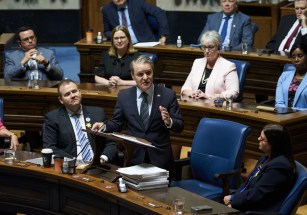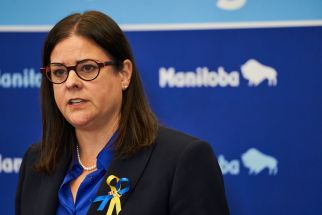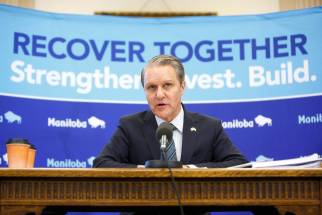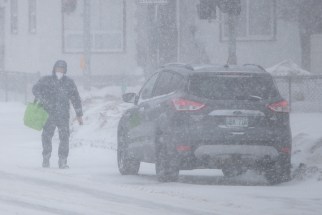A dozen things to know about Manitoba’s budget
Read this article for free:
or
Already have an account? Log in here »
To continue reading, please subscribe:
Monthly Digital Subscription
$0 for the first 4 weeks*
- Enjoy unlimited reading on winnipegfreepress.com
- Read the E-Edition, our digital replica newspaper
- Access News Break, our award-winning app
- Play interactive puzzles
*No charge for 4 weeks then price increases to the regular rate of $19.00 plus GST every four weeks. Offer available to new and qualified returning subscribers only. Cancel any time.
Monthly Digital Subscription
$4.75/week*
- Enjoy unlimited reading on winnipegfreepress.com
- Read the E-Edition, our digital replica newspaper
- Access News Break, our award-winning app
- Play interactive puzzles
*Billed as $19 plus GST every four weeks. Cancel any time.
To continue reading, please subscribe:
Add Free Press access to your Brandon Sun subscription for only an additional
$1 for the first 4 weeks*
*Your next subscription payment will increase by $1.00 and you will be charged $16.99 plus GST for four weeks. After four weeks, your payment will increase to $23.99 plus GST every four weeks.
Read unlimited articles for free today:
or
Already have an account? Log in here »
Hey there, time traveller!
This article was published 12/04/2022 (1337 days ago), so information in it may no longer be current.
As the COVID-19 pandemic continues, Manitoba is laying a “recovery” roadmap in its 2022 budget that aims to ease the burden on health care and hand out more tax breaks.
The Tory government’s spending plan sets out to slash wait times for diagnostic and surgical procedures, boost intensive-care capacity to a new high and deal with new coronavirus variants that could ramp up pressure on exhausted health workers.
Despite increased spending in critical areas and an ongoing deficit, the Tories are offering tax incentives and other perks to Manitobans, including a new credit for renters, an increase in the education property tax rebate, cheaper vehicle registration fees and hundreds more child-care spaces with Ottawa’s help.
Here are 12 things to know about Budget 2022:
Education property tax rebate
The average homeowner will save a total of $581 in 2022 and $774 in 2023 thanks to an education property tax rebate increase that is part of a 10-year phase-out.
The rebate for residential and farm properties will rise from 25 per cent to 37.5 per cent in 2022 before climbing to 50 per cent next year. The rebate for commercial property owners is staying at 10 per cent.
Total savings from the rebate amount to $350 million in 2022 and $453 million in 2023.
New tax break for renters
Residential renters will get back $43.75 per month or a maximum of $525 per year under a new tax credit that replaces the renters component of the education property tax credit.
The new credit will be extended to 45,000 households who receive non-EIA Rent Assist or who live in social housing.
About 40 per cent of Manitoba households live in rented homes.
More child-care spaces
Manitoba is creating 716 spots in child-care centres and 50 home-based spaces, while expanding eligibility of the subsidy program, which costs $10 a day per child for regulated spaces.
Finance Minister Cameron Friesen said the province is tripling the number of children who are eligible for the subsidy by making financial assistance available to about 28,600 kids.
A total of $267 million is available in 2022-23 under Manitoba and Ottawa’s Canada-Wide Early Learning and Child Care Agreement.
The provincial budget includes $20 million to increase salaries for child-care workers.
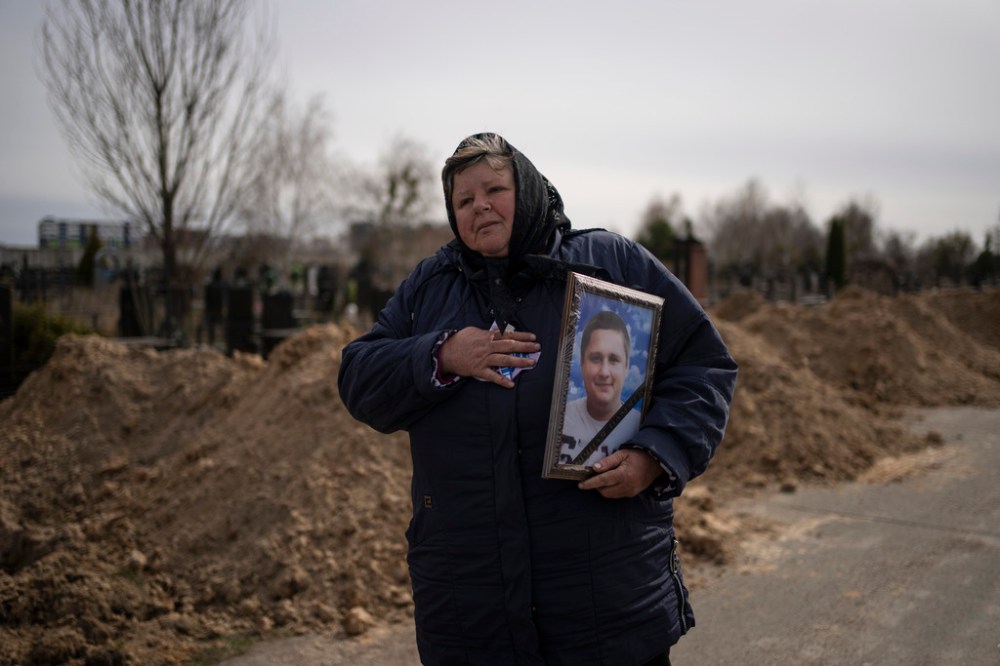
Pandemic response and Ukraine
Manitoba is spending $630 million on contingencies and COVID-19 readiness, response and recovery to continue the fight against the virus and prepare for future variants.
In the contingencies category, a to-be-determined sum will go toward helping Ukrainian refugees who come to Manitoba after fleeing Russia’s invasion.
The $630 million is held centrally and will be dished out to ministries as required.
No target for ending surgical backlog
The budget includes $110 million — a year-on-year increase of $70 million — to reduce the diagnostic and surgical backlog, which swelled as the health-care system was reorganized to cope with COVID-19.
At separate news conferences inside the Manitoba Legislative Building, neither Premier Heather Stefanson nor Friesen would commit to setting a target date for when the government hopes to clear the backlog.
The Diagnostic and Surgical Backlog Task Force could seek additional capacity from private clinics or possibly send patients out of province in an effort to reduce wait times.
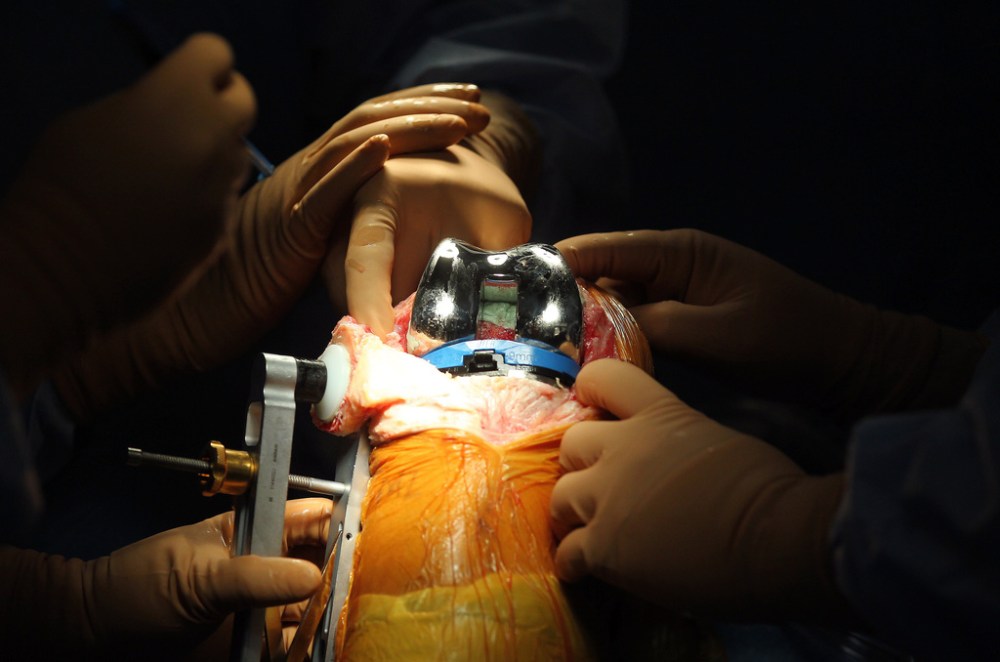
Record ICU bed baseline
Hospital intensive-care units were pushed to the brink as staff cared for rising numbers of critically ill COVID-19 patients.
Manitoba had a baseline of 72 ICU beds before the pandemic, and Friesen said $9 million in funding will add 28 for a record total of 100. Dozens of existing nurses have been given ICU training.
The province also announced plans to add 400 permanent nursing seats at post-secondary institutions over two years, and to triple the size of St. Boniface Hospital’s emergency room at a cost of $100 million.
Mental-health and addictions
The province is spending $390 million this year on mental-health and addiction supports, including $17 million on the first of a five-year plan to increase capacity and capability in areas such as emergency detox, treatment and housing.
In other measures, hours at two Rapid Access to Addictions Medicine clinics will be expanded, and the government will try to reduce wait lists for the Women’s Health Clinic’s Provincial Eating Disorder Prevention and Recovery Program.
Vehicle owners save $10
The third and final reduction in non-commercial vehicle registration fees amounts to 10 per cent, for a total of $15 million in annual savings for Manitobans.
Most owners of passenger vehicles, trucks, trailers, motorcycles or mopeds will save $10, starting with renewals after June 30.
New schools
Manitoba is pushing ahead with its goal to build 22 new schools by 2027. Ten schools will be open or under construction by the end of 2022-23.
The province is increasing operating funding to schools by $125.4 million this year to help cover things such as wages and COVID-related costs.
A new education-sector council will influence provincial, local and school-level planning.
Extra cash for farmers
Nearly $99 million, up from $85 million last year, is going toward programs to help farmers whose incomes are hurt by factors such as weather, pests and prices.
The province is spending an additional $220,000 on animal disease diagnostics, risk assessment and response.
Reconciliation with Indigenous communities
One of the province’s goals for 2022 is working with Indigenous communities to improve economic and other opportunities and address the harms of residential schools in a step towards “true equality.”
Announcing a new fund, the government said it will put $5 million toward “reconciliation activities” based on guidance from First Nations, Métis and Inuit people.
Companies spared from payroll tax
The payroll tax is being reduced for 970 businesses, with 180 to be exempt from having to pay it at all.
Friesen said the exemption level is rising to $2 million and the payroll threshold to $4 million to avoid discouraging growth.
The province also announced a new venture capital fund with an initial $50-million investment to encourage innovation and expansion.
chris.kitching@freepress.mb.ca
Twitter: @chriskitching
As a general assignment reporter, Chris covers a little bit of everything for the Free Press.
Our newsroom depends on a growing audience of readers to power our journalism. If you are not a paid reader, please consider becoming a subscriber.
Our newsroom depends on its audience of readers to power our journalism. Thank you for your support.
History
Updated on Thursday, April 14, 2022 6:12 PM CDT: number of Rapid Access to Addictions Medicine clinics to be expanded

.jpg?w=100)


